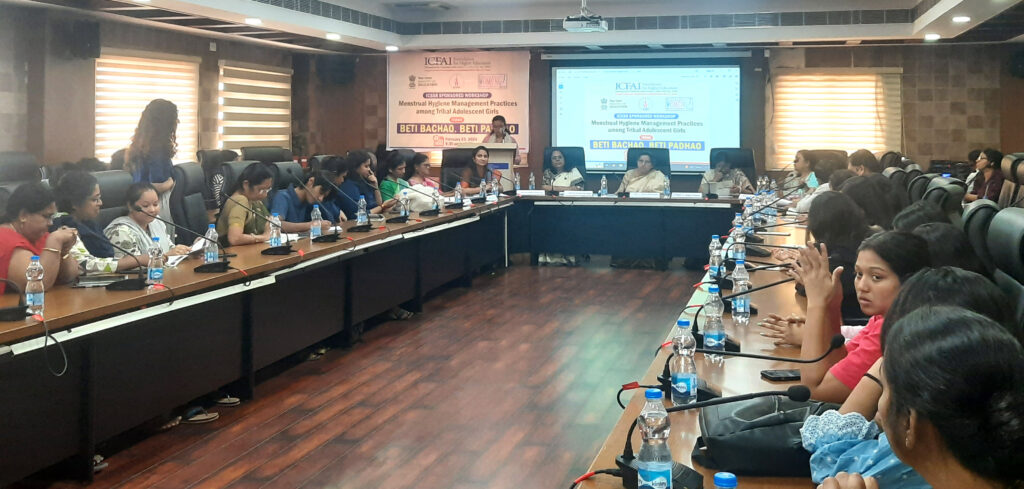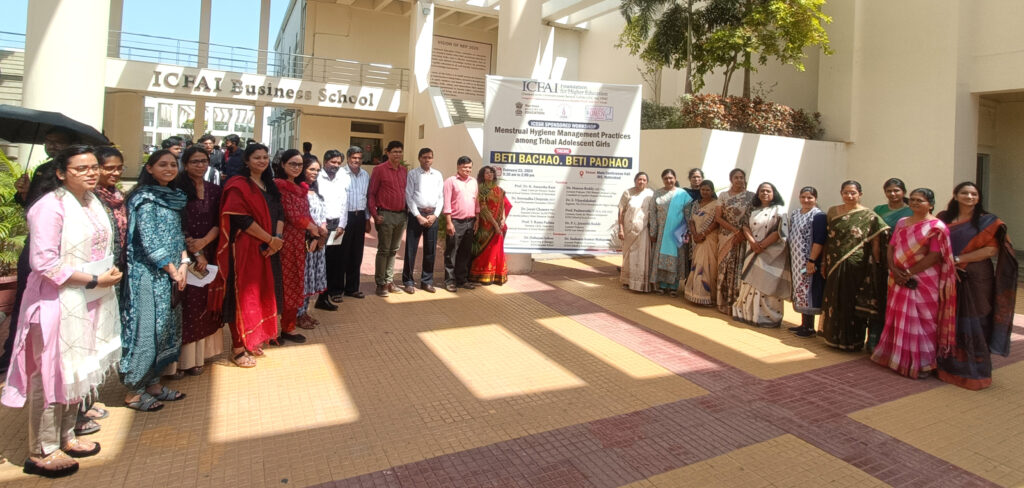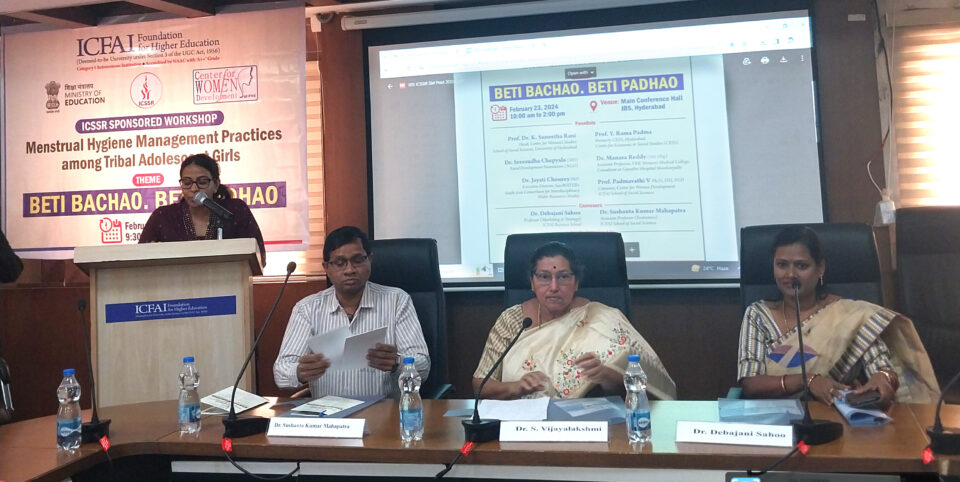Centre for Women Development (CWD), a constituent of ICFAI Foundation for Higher Education (IFHE), Hyderabad conducted a Workshop and Panel Discussion on the theme “Beti Bachao, Beti Padhao” titled “Menstrual Hygiene Management Practices among Tribal Adolescent Girls” on 23rd February 2024 at its campus. The workshop was sponsored by Indian Council of Social Science Research (ICSSR), Ministry of Education, Government of India.
Eminent Expert Speakers :
The Panel Discussion consisted of eminent experts from academics, NGOs, practitioners ,industry. Professor Dr. K. Suneetha Rani, Head of the Centre for Women’s Studies at the School of Social Sciences, University of Hyderabad; Y. Rama Padma, Formerly associated with the Centre for Economic & Social Studies (CESS), Hyderabad, Dr. Sreesudha Chepyala, Doctor of Medicine (MD) and Representative of the Rural Development Foundation (NGO), Dr. Manasa Reddy, Assistant Professor at VRK Women’s Medical College and Consultant at Gayathri Hospital, Shankarpally and Yello Diagnostics Kokapet; Ms. Judith Christiana, Manager of Grassroots Implementation at South Asia Consortium for Interdisciplinary Water Resources Studies(SaciWATERs); Prof. V. Padmavathi, Convener of the Center for Women Development, ICFAI School of Social Sciences; Dr. S. Vijayalakshmi, Registrar, ICFAI Foundation for Higher Education; Dr. P.L. Jayanthi Reddy, Assistant Professor, ICFAI Law School, Hyderabad and Convenor, Center for Women Development, ICFAI Law School participated in the workshop.
Dr. Sushanta Kumar Mahapatra and Dr. Debjani Sahoo presented their insightful research findings on menstruation, a natural biological process in women, not only symbolizes their reproductive capacity but also unveils the multifaceted challenges that they encounter, particularly in India. The discussion traversed various facets of menstrual Hygiene Management (MHM), encompassing issues such as inadequate water and sanitation facilities, insufficient education, and entrenched social stigmas etc. The research was conducted in the Mayurbhanj district of tribal Odisha. Both the researchers garnered profound insights into the socio-economic determinants influencing MHM practices. The findings underscore a pressing need for policymakers to prioritize women’s literacy and MHM education.
 Dr. S. Vijayalakshmi, Registrar of ICFAI in her inaugural address emphasized the criticality of menstrual hygiene education, encapsulating the adage that “Health is wealth and addressed the prevailing stereotypes and taboos surrounding menstruation, underscoring their detrimental effects on women’s health subsequently.
Dr. S. Vijayalakshmi, Registrar of ICFAI in her inaugural address emphasized the criticality of menstrual hygiene education, encapsulating the adage that “Health is wealth and addressed the prevailing stereotypes and taboos surrounding menstruation, underscoring their detrimental effects on women’s health subsequently.
In the Panel Discussion Prof. Dr. K. Suneetha Rani addressed the difficulties and myths associated with menstruation, emphasizing the need for gender-sensitive approaches and the integration of menstrual hygiene in global health policies. Dr. Y. Rama Padma highlighted the significance of ethical and comprehensive research to address the multifaceted aspects of menstrual hygiene.
Ms. Judith Christiana emphasized the importance of co-creating knowledge and advocated for the inclusion of boys in discussions surrounding menstruation. She also highlighted the role of Self Help Groups (SHGs) and Pad Banks in ensuring accessibility to menstrual hygiene products. Dr. Sreesudha Chepyala focused on early and irregular menstruation, offering insights into preventive measures. Dr. Manasa Reddy discussed the root causes of cervical cancer and emphasized the role of menstrual hygiene in reducing its risk. Additionally, she highlighted the benefits of cloth pads and the importance of balanced nutrition for reproductive health.
 Dr. P.L. Jayanthi Reddy provided a legal perspective on menstruation, citing relevant legislative initiatives and highlighting regional disparities in addressing the issue. Prof. V. Padmavathi emphasized the importance of studying behavioral patterns during menstruation cycles and deliberated on the merits of menstrual leave policies.
Dr. P.L. Jayanthi Reddy provided a legal perspective on menstruation, citing relevant legislative initiatives and highlighting regional disparities in addressing the issue. Prof. V. Padmavathi emphasized the importance of studying behavioral patterns during menstruation cycles and deliberated on the merits of menstrual leave policies.
More than 100 delegates attended the workshop that comprised NGO officials, faculty, students, non-teaching staff, housekeeping ladies, etc..


